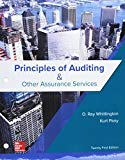
Concept explainers
If a corporation overstates its earnings, are its liabilities more likely to be overstated or understated? Explain.
Explain whether the overstatement of the income would result in the overstated liabilities or understated liabilities.
Explanation of Solution
Overstatement:
It refers to the situation where the amount of any item has been stated more than its actual figure. Overstated revenue results in an overstatement of profits. Similarly, overstated liability results in understating of shareholders’ equity.
Understatement:
It refers to the situation where the amount of any item has been stated less than its actual figure. Understated revenue results in an understatement of profits. The understated liability results in overstating of shareholders’ equity.
Explain whether the overstatement of the income would result in the overstated liabilities or understated liabilities:
Overstatement of the income would result in the understated liabilities. When the income of the company has increased then the shareholder’s fund would result in the overstated. The overstated shareholder fund would result in the understated of other liabilities in order to balance the liability side. When the profit earns for the company, then the resulted profit would decrease the overall balance of the liabilities. So there is an inverse relationship between the profit balance and the liabilities balance of the business.
Thus, the overstatement of income would lead to understated liabilities.
Want to see more full solutions like this?
Chapter 14 Solutions
GEN COMBO LL PRINCIPLES OF AUDITING & OTHER ASSURANCE SERVICES; CONNECT AC
- Module 6 Discussion Discuss the significance of recognizing the time value of money in the long-term impact of the capital budgeting decision. 60 Replies, 59 Unread Σarrow_forwardHow many weeks of supply does summit logistics Inc. Hold ?arrow_forwardI need some help with letter c. I have done the calculations correctly, but if there is anything wrong, please correct them.arrow_forward
- correct options is answer.arrow_forwardnone.arrow_forwardQuestion 3Footfall Manufacturing Ltd. reports the following financial information at the end of the current year: net sale $100 000 debtor's turnover ration (based on net sales) 2 inventory turnover ration 1.25 fixed assets turnover ratio 0.8 debt to assets ratio 0.6 net profit margin 5% gross profit margin 25% return on investment 2% Use the given information to fill out the templates for income statement and balance sheet given below: Income Statement of Footfall Manufacturing Ltd. for the year ending December 31, 20XX(in $) sales 100,000 cost of goods sold gross profit other expenses earnings before tax tax @50% earnings after tax Balance Sheet of Footfall Manufacturing Ltd. as at December 31, 20XX (in $) liabilities amount assets amount equity net fixed assets long term debt 50, 000 inventory short term debt debtors…arrow_forward
 College Accounting, Chapters 1-27AccountingISBN:9781337794756Author:HEINTZ, James A.Publisher:Cengage Learning,
College Accounting, Chapters 1-27AccountingISBN:9781337794756Author:HEINTZ, James A.Publisher:Cengage Learning, Auditing: A Risk Based-Approach (MindTap Course L...AccountingISBN:9781337619455Author:Karla M Johnstone, Audrey A. Gramling, Larry E. RittenbergPublisher:Cengage Learning
Auditing: A Risk Based-Approach (MindTap Course L...AccountingISBN:9781337619455Author:Karla M Johnstone, Audrey A. Gramling, Larry E. RittenbergPublisher:Cengage Learning EBK CONTEMPORARY FINANCIAL MANAGEMENTFinanceISBN:9781337514835Author:MOYERPublisher:CENGAGE LEARNING - CONSIGNMENT
EBK CONTEMPORARY FINANCIAL MANAGEMENTFinanceISBN:9781337514835Author:MOYERPublisher:CENGAGE LEARNING - CONSIGNMENT





